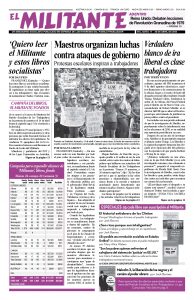PARIS — An eerie silence settled over the deserted Gare de l’Est train terminal here April 9, replacing the noisy hum of the hundreds of thousands of passengers who normally crisscross the station daily. In a wave of rolling strikes, railroad workers have been bringing much of French transit — both freight and passenger service — to a halt.
Rail unions have called for two days on strike followed by three days of work in a repeating cycle for the next three months. They are protesting the French government’s plan to reorganize the SNCF national rail system, targeting workers’ job rights. Currently rail workers have legal protections against layoffs and firings, a result of decades of class battles. These protections are commonly called “special status.” Under the government’s plans, new hires would no longer have these protections, creating a divisive two-tier system. Most rail workers fear these steps will lead to deeper attacks.
The government of President Emmanuel Macron is going after the unions in France and seeking other cutbacks to strengthen French capital and its ability to compete and reap profits. They hadn’t expected the solidarity of rail workers with the “new hires.”
Bondholders are increasingly worried about the fate of the SNCF’s 47 billion euro debt. Macron says that the government is willing to pick up part of the debt — as long as the rail workers give up their hard-won gains.
Rail workers held an April 13 strike meeting at Paris’ Gare du Nord, the largest train station in Europe. Worker after worker spoke, demanding the unions go beyond their call for two-day rolling strikes. Support for this position was adopted by majority vote. The meeting also voted to set up a strike fund to finance printing costs to reach passengers and other workers. The strikers also discussed the possibility of uniting their strike protests with actions taking place by other workers and students.
One striker gave a report on the 44-day strike last December against ONET company by mostly immigrant workers subcontracted to clean the trains and rail stations in the north of Paris. These workers don’t have “special status,” which is reserved for French citizens. “We should look for convergence between our struggles and theirs,” she said. ONET workers marched with the rail workers at the March 22 demonstration that opened the current round of strikes.
Gauthier Tacchella is an engineer with eight years at the SNCF and a member of the Strike Organization Bureau at Gare du Nord. He told the Militant that they would be looking for common actions with hospital workers, students and strikers at Carrefour, a Walmart-like chain in France and elsewhere. The Strike Organization Bureau is a voluntary association of strikers, both union members and nonunion, who do much of the organizational work for the strike. A similar association called the Mobilization Committee exists at the Gare de l’Est terminal.
Some 20,000 Carrefour workers went on a one-day nationwide strike March 31. The retail giant has a total workforce of 115,000. The strike was a protest against boss plans to slash 5,200 workers this year and close 273 smaller stores. Many workers can’t get full-time work and face split shifts and ever-changing schedules.
Marc Kinzel, who works in the port of Marseille, told the Militant that his local Carrefour was barricaded by striking workers who had moved in shopping carts to block access. “It wasn’t a normal French strike,” he said, “It was more like a determined mobilization for dignity.”
After their meeting, strikers at Gare du Nord were joined by fellow rail workers from Gare St Lazare, Gare de l’Est and Gare d’Austerlitz to march across Paris to Tolbiac University. It’s one of a number of campuses across the country where students have been occupying buildings in opposition to government moves to “reform” university level education.
The two demonstrations — some 2,000 students and workers in about equal numbers — came together, chanting, “Rail workers, students, same Macron, same struggle.”
The night before, the police raided the Sorbonne to evict students occupying the university center there.
Marc Kinzel in Marseille and Claude Bleton in Paris contributed to this article.

